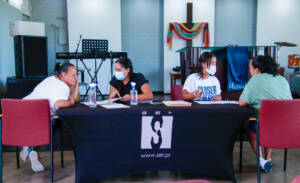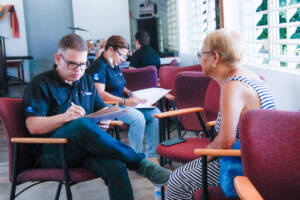By: Yarimar Marrero Rodríguez
Since 2014 we have taken our services to communities in Puerto Rico. We rarely delve into the work carried out by this team of professionals and volunteers. In this interview you can learn a little more about how the Academic Liaison and Social Impact Programs division was formed, by the hand of Yolanda Rodríguez León, Manager of our programs.

SER de Puerto Rico has the mission of expanding its service model and moving to the communities to reach people who, due to distance, poverty or limiting physical condition, cannot reach the centers where the organization operates. Responding to the need for services, guidance and equipment of people with disabilities and their families, from early intervention to the immediate response to an atmospheric event, is that the division of community programs in SER de Puerto Rico is developed. The coordination and implementation of these programs is linked to the direct support of the community, political and religious leaders of each impacted municipality in conjunction with the interdisciplinary team of our Institution led by the Doctor of Social Work Yolanda Rodríguez León.
YMR: Can we refer to Expedición Salud, implemented in 2014, as the first community initiative in the Institution? What were its precedents?
YRL: Yes, that was the first Community Program, the first time we considered that we could offer services outside the Centers. It occurs at a very important juncture because SER had just become part of the ORITEL network. We met Dr. Sevilla who is the medical director at TELETON in Nicaragua and he spoke to us with great enthusiasm about the community work they did in his country. There we began to think from what our greatest experience is, caring for children, and we conceptualized Expedición Salud. A multidisciplinary care program for children between zero and six years of age who did not have an established diagnosis using an early intervention approach.
YMR: Why do you think SER should expand its service model and make the therapies, equipment, supplies and guidance that it offers accessible to people directly in their communities?
YRL: Because it is an acknowledgment that there is a great inequity in health in Puerto Rico and that there are specialized and quality services that we offer that many people would not otherwise have the opportunity to receive. It is important to look at the history of the programs where we have been serving mainly older adults and that is because we thought of this need as a result of hurricanes Irma and María. When recognizing the situation of the country, one of the questions was, where were these historically invisible and more impoverished populations and what had happened to them?

YMR: SER 360, which arose in response to the need of Puerto Ricans after Hurricanes Irma and María, became a far-reaching pilot program: How challenging was it to launch a program of this magnitude and tell us a little about it? success and reception they have had?
YRL: Working with SER 360 was a whole new experience. It was thinking about it from scratch, we had the funds and we were happy, but we had to conceptualize even what format we were going to use to collect the information on the street and also in the conditions in which the country was. We started with SER 360 on February 2, 2018 in Culebra, after that Vieques, after that Utuado and so we continued throughout the Island. Those first times we went out (in the mobile clinic), we validated that what we were doing was necessary and we had to continue doing it because people felt visible. The number of people who told us, "the hurricane passed six months ago and you are the first people to reach us." That type of information that excites and shocks was what kept giving us the strength to continue. Something very important is that when the funds of Unidos Por Puerto Rico, which sponsored us, ran out, our President and the Board of Directors said: "we are going to assume this program because we understand that it is necessary", that was a great recognition to the work we do and to the work of the team.
YMR: From your experience in the field, do you consider that there is a sector of the population with disabilities or functional diversity that is more vulnerable or that requires more attention from the government and non-governmental institutions?
YRL: There is a sector that has to do with people who are born with very severe conditions, these people are not cared for by anyone after they are twenty-one years old. That population is not seen until they appear on the news. So that population of adults with severe disabilities sadly falls into limbo from twenty-one to sixty. On the other hand, there is a population of older adults who lack everything and to the extent that the municipalities stop having services, support and public transportation, they continue to be left in such isolation, in such great loneliness, in a lack of resources and the saddest thing is that they accommodate to that. That hopelessness in those population sectors of those parents who don't know what will happen to their son when they are gone. One, who is on the street, thinks how much they need and the truth is that the Non-Governmental Organizations are doing a brutal job, but there are some things that continue to affect the state, which are those who have the economic resources and the responsibility .
YMR: Do you remember a particular story that you have lived through working directly with our people in their communities and that has been especially meaningful to you?
YRL: I always remember a man in Loíza who had a stroke, he had hemiplegia, he lived in a house without light, without water, we tried to tell him that these were not living conditions, but that was his space, it was his home, he had some puppies that were his only companions and he told us that he was not going to leave the dogs behind. So a situation like this leaves you speechless. The truth is that we couldn't force him to leave, that's his life and respecting that takes a lot of work, that kind of experience is very frustrating. You have to learn to respect self-determination. Another thing that really catches my attention is the people who pray for us. Those people who take the time to pray. When an elderly person says goodbye to us from his house and tells us, "wait for a moment I can pray for you" then you say we are doing what we have to do. Each outing is a significant and different experience.
YMR: How do you see the future of community programs at SER de Puerto Rico?
YRL: We continue betting that we have to return to the communities, we bet that we are providing a service that other professionals are not providing and that the population needs. We continue betting that the experience will give us the idea and the strategy that we need to continue. I always ask for wisdom to know when to start transforming things and thank God, it is a job that I do not do alone because the coordinators of the other two programs and the entire team are spectacular, in the end it is my responsibility and I I have to make the decision, but the accompanied path is always better.
